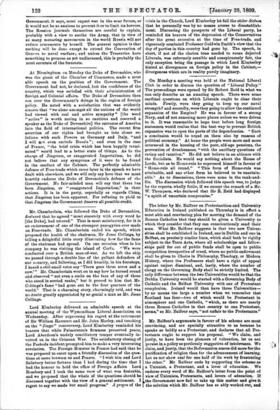Lord Kimberley delivered an admirable speech at the annual meeting
of the Wymondham Liberal Association on Wednesday. After expressing his regret at the retirement of Sir William Harcourt and Mr. John Morley, and touching on the "Jingo" controversy, Lord Kimberley reminded his hearers that while Palmerston's firmness preserved peace, Lord Aberdeen's unduly conciliatory temper eventually in- volved us in the Crimean War. The satisfactory closing of the Fashoda incident prompted him to make a very interesting revelation. The Foreign Minister in France had said that he was prepared to enter upon a friendly discussion of the ques- tions at issue between us and France. "I wish him and Lord Salisbury better fortune than I had during the time that I had the honour to hold the office of Foreign Affairs Lord Rosebery and I took the same view of what was desirable, and we proposed that the whole of the questions should be discussed together with the view of a general settlement. I regret to say we made but small progress." A pros of the
crisis in the Church, Lord Kimberley let fall the obiter dictum, that he personally was by no means averse to disestablish- ment. Discussing the prospects of the Liberal party, he reminded his hearers of the depression of the Conservatives after the great secession at the time of Free-trade, and vigorously combated Professor Goldwin Smith's view that the day of parties in this country had gone by. The speech, in short, if not of the clarion tone needed to rouse dejected Liberals, was extremely sensible and conspicnously fair, the only exception being the passage in which Lord Kimberley hinted at divergences on foreign policy in the Cabinet,— divergences which are in reality purely imaginary.


















































 Previous page
Previous page